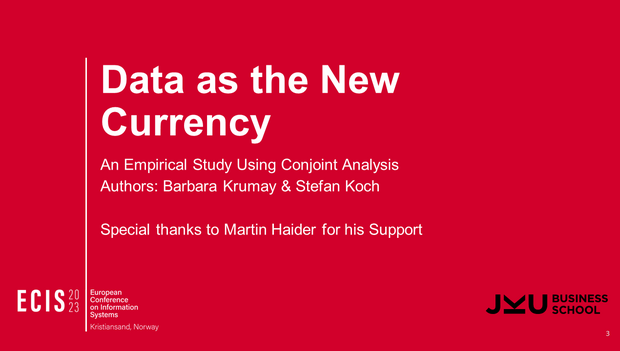Konferenzbeitrag: Daten als neue Währung? ECIS 2023
Barbara Krumay und Stefan Koch präsentieren Ergebnisse der Studie "Data as the New Currency - An Empirical Study Using Conjoint Analysis" und tragen zur Klärung bei, welchen Wert Konsument:innen ihren privaten Daten beimessen.

Barbara Krumay und Stefan Koch (JKU Business School, Institut für Wirtschaftsinformatik - Information Engineering) haben die Ergebnisse der Studie "Data as the New Currency - An Empirical Study Using Conjoint Analysis", öffnet eine externe URL in einem neuen Fenster auf der European Conference on Information Systems (ECIS) 2023 in Kristiansand, Norwegen, präsentiert.
Untersucht wurde die Bereitschaft von Konsument:innen, für Online-Dienste monetär (also tatsächlich mit Geld) oder mit ihren privaten Daten zu bezahlen. Mithilfe einer Conjoint-Analyse wuren die Präferenzen untersucht. Es zeigt sich: die Präferenzen hängen direkt mit dem Online-Dienst, der genutzt werden soll, zusammen.
Abstract
Since data and information are becoming important factors in competitiveness in the digital age, organisations tend to have an enormous appetite for data. However, users are becoming increasingly reluctant to provide their data without receiving some benefits. Therefore, it is necessary to identify the extent to which consumers are willing to protect their data by paying for the use of a service with money or with data. This study investigates willingness to pay for an online service by examining both money and data as currency (i.e. the users’ privacy costs). Furthermore, this study is an empirical investigation that uses conjoint analysis to determine whether different service types show different preferences and which characteristics are decisive. The findings show that the online service used has an impact on whether people pay with money or their data.
